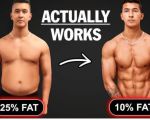Understanding the Role of Genetics in Fitness and Bodybuilding
When it comes to fitness and bodybuilding, we often hear about hard work, dedication, and consistency. But what if I told you that your genetic makeup could be just as important as the effort you put in at the gym? It's a common myth that anyone can achieve the same level of muscle growth and physical transformation with the right workout and diet plan. While hard work is essential, your genetics can heavily influence how your body responds to exercise, how quickly you build muscle, and even the shape of your physique.
How Genetics Influence Muscle Growth
At the most basic level, genetics play a significant role in determining your muscle fiber type, hormone levels, and metabolic rate. These factors can influence how efficiently your body builds muscle and burns fat. People with a genetic predisposition for a higher proportion of fast-twitch muscle fibers, for example, may have an easier time building muscle mass compared to someone with more slow-twitch fibers. This is one of the reasons why some individuals seem to make quicker gains in strength and muscle size, even with similar workout routines.
The Science Behind Muscle Growth and Genetics
Muscle growth, or hypertrophy, occurs when the fibers of a muscle are subjected to stress—like the kind of resistance training done in bodybuilding. This stress causes microscopic tears in the muscle fibers, which then repair and grow back stronger. Genetics can influence how quickly this process occurs, as well as how effectively your body can repair and rebuild muscle tissue. For instance, some people have a higher natural production of growth hormones, which accelerates muscle repair and growth.
Body Types and Their Impact on Fitness
Another crucial aspect influenced by genetics is your body type, which can play a role in how easily you gain muscle or lose fat. There are three main body types: ectomorphs, mesomorphs, and endomorphs. Ectomorphs tend to have a naturally lean build and find it difficult to gain weight or muscle mass. Mesomorphs, on the other hand, tend to have a more athletic build and gain muscle relatively easily. Endomorphs often have a higher percentage of body fat and may struggle to lose weight but can gain muscle quickly when they put in the work. Understanding your body type is crucial because it allows you to tailor your workouts and nutrition plan to your genetic strengths and weaknesses.
My Personal Journey with Genetics and Fitness
I still remember the early days of my fitness journey when I was trying to build muscle like some of the bodybuilders I admired. I put in hours at the gym, ate meticulously, and followed the best routines I could find. However, no matter how hard I tried, the results seemed slower than what I'd hoped. At first, I felt frustrated—what was I doing wrong? It wasn't until I learned more about fitness genetics that I understood my muscle fibers and natural body type were holding me back in some ways. As an ectomorph, I struggled to gain size despite putting in the effort. But once I adjusted my diet to prioritize more calories and focused on lifting heavier weights with longer rest periods, I began to see more noticeable results.
Genetics and Your Ability to Build Strength
Genetics can also impact how strong you can get. While muscle growth and strength are linked, they are not exactly the same thing. Some individuals might find that they can lift heavy weights and increase their strength rapidly, even though they don’t necessarily build large muscles at the same rate. This difference is due to how efficiently your body can recruit motor units (the nerves and muscle fibers that work together to produce force). If you have a genetic advantage in this area, you may find that your strength gains are quicker than someone else’s, even if your muscle growth isn’t as pronounced.
The Impact of Hormones on Muscle Development
Another way genetics plays a role in bodybuilding is through hormones. Testosterone, growth hormone, and insulin-like growth factor (IGF) are all key players in muscle development. People with higher natural levels of testosterone, for example, tend to build muscle more easily. While you can’t change your genetic predisposition for hormone levels, you can optimize your workouts and nutrition to maximize your body’s ability to produce and use these hormones effectively.
Optimizing Your Training Based on Your Genetic Strengths
While genetics certainly play a role in your fitness journey, that doesn’t mean you’re stuck with your genetic blueprint. Instead, you can use this knowledge to tailor your approach to fitness. For example, if you’re an ectomorph struggling to gain muscle mass, it might help to focus on eating more nutrient-dense foods with a high calorie count. Additionally, you can emphasize strength training that targets hypertrophy with compound movements like squats, deadlifts, and bench presses. If you're an endomorph, focusing on fat loss while maintaining muscle mass may require a more intense cardiovascular regimen in addition to your strength training routine.
The Power of Mindset and Consistency
While genetics are undoubtedly important, it’s also crucial to remember that mindset, consistency, and hard work are what ultimately drive success in bodybuilding. Genetics may set the foundation, but how you train, eat, and recover will determine how you reach your potential. You might not have the same muscle-building potential as someone else, but with the right mindset, dedication, and knowledge of how to optimize your genetic strengths, you can still achieve amazing results in bodybuilding and fitness.
Real-World Examples of Genetics in Bodybuilding
If you look at famous bodybuilders, you'll notice that many of them have unique genetic traits that contribute to their success. For example, Arnold Schwarzenegger, who became one of the most famous bodybuilders of all time, had an incredible combination of genetics, work ethic, and passion for bodybuilding. His genetic predisposition for muscle growth was obvious, but his relentless training and commitment to the sport elevated his physique to legendary status. Another example is Frank Zane, who had a more "classic" physique, with a focus on aesthetics and symmetry. While his genetics didn’t give him the bulk of some of his competitors, he was able to maximize his physique in a way that suited his body type perfectly.
Is Genetics the Ultimate Factor in Your Fitness Journey?
While genetics are undeniably influential in bodybuilding and fitness, they are far from the only factor that determines success. Ultimately, the key to achieving your fitness goals lies in understanding your body, staying consistent, and adapting your training and nutrition to your unique needs. Whether you're a seasoned bodybuilder or a beginner, embracing the role genetics play in your journey will empower you to push forward and make the most of what you have. It's not about comparing yourself to others, but about becoming the best version of yourself, based on your body’s natural potential.








